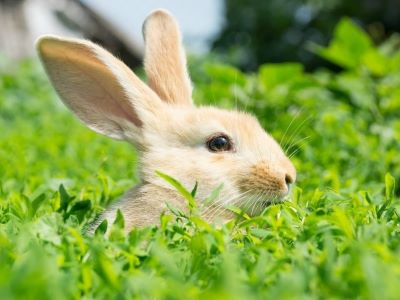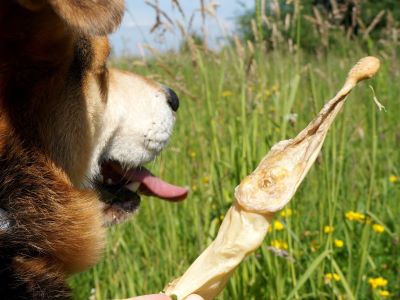There are so many delicious dog treats, one of them is rabbit ears. but “Are rabbit ears good for dogs?”
Rabbit ears are a nutritious treat for dogs. In this blog, we are going to find out some more fun and important facts about rabbit ears.
So, don’t let those bunny ears go to waste, let your dog enjoy them as delicious, healthy chew. So, without a further due, let’s hop.

Are Rabbit Ears Good for Dogs?
Yes, Rabbit ears are a good treat for your dog. They are not only tasty but they offer a lot of nutritional benefits too.
And yes they come from rabbits, now you don't have to worry, these treats are made from the parts that are safe for dogs. They are sourced and prepared ethically in the right way for your dog. Here are some steps:
🐰Harvesting: The ears are carefully collected from rabbits, ensuring that it’s done humanely and ethically.
🐰Cleaning: After collecting them the ears go through a complete cleaning cycle. This makes sure that what reaches your dog’s bowl is not only delicious but also safe to chew on. No, risks here!
🐰Drying: After cleaning, the ears are dried to create that chewy texture dogs love. This step also helps keep the natural goodness without requiring any artificial help.
Now, let’s understand the nutritional benefits in detail:
1. Nutritional Content
Dogs are not just the best cuddle partners, they are also carnivores at heart. Protein is a very important part of their diet. Protein helps in muscle development, energy, and overall health.
Rabbit ears are lean protein machines. Less fat, and more muscle-building elements of their diet, perfect for their strength. Rabbit ears also contain crucial protein, vitamins, and minerals for your dog.

2. Dental Benefits
When your dog chews on rabbit ears, it’s like an exercise for their teeth. The chewing keeps those white teeth clean, preventing any plaque and tartar from developing on teeth.
They are just like natural toothbrushes for dogs, the more they chew the better chances they have at preventing dental issues. Even for their gums, this is the best, all-in-one gym exercise for the entire mouth.
3. Digestibility
Some dogs can be a bit choosy when it comes to food. Rabbit eats are hypoallergenic food. Hypoallergenic foods are like people who get along with everyone.
They are smooth in the stomach system and only sometimes cause allergic reactions. You can consult with the dog before feeding them this.
4. Weight Management
If your dog needs to lift off some pounds then rabbit ears are ultimate in their diet.
Being low in fat and high in protein makes them perfect. They are tasty without all those worrying about the calories.
How to Introduce Rabbit Ears?
You can slowly start adding rabbit ears to your dog’s diet. Introduce this gradually, start with the small piece and see how your dog reacts to it.
Make sure you are around in the beginning to see if there is not any issue while chewing them. Moderation is the key, don’t feed them rabbit ears every day. Too much of anything can be bad.

Remember, every dog is unique and so are their food choices. Pay attention to their weight, activity, and how they react to the treats. Adjust according to their reaction.
Safety Concerns
It is important to make sure your dog’s food is safe for them. Here are some steps to make sure this
- Choosing high-quality rabbit ears is important. Look for good and natural rabbit ears, and check the labels and ingredients for better understanding.
- Don’t add anything extra to this already tasty treat. Too many preservatives and additives may not sit well with your dog’s stomach and digestive system.
- Just like all the breeds differ in sizes their treats differ in sizes too. Feed dogs rabbit ears according to their comfort and size. Small ears for small breeds and big ears for bigger breeds are just the right fit.
- Dogs express themselves through their behaviour, so watch out for their reaction after feeding them rabbit ears. If you see signs of discomfort or stomach issues it’s best to consult with the vet quickly.
Potential Issues
Sometimes good intentions can lead to bad incidents, that’s why it is important to prevent some issues, let’s understand them:
Allergies
Just like us humans, dogs can be allergic too! This is why it is important to watch out for unexpected reactions. When you give them rabbit ears, wait a while for any reaction.
Signs may include itching, upset stomach, or odd behaviour, and if you notice anything it’s best to consult with the vet. If you find your dog to be allergic then you don’t have to worry there are many other alternatives available.
Overconsumption
Imagine yourself, eating that whole turkey. not the best idea, right?! Dogs are curious, they will eat everything you feed them.
This is why you must look after their diet. Stick to moderate numbers of rabbit ears per week. Keeping track helps in maintaining a healthy balance. After all a healthy dog is a happy dog.

Giving them treats makes them happy but it is important to prevent the potential issues.
Alternatives of rabbit ears
Rabbit ears are natural treats that provide dogs with protein and important nutrients for health. This helps in better digestion, dental health and anxiety or stress. However, some dogs may have trouble chewing them or may be sensitive to them, so here are some alternatives:
- Chicken feet or duck feet: These are also natural treats that dogs like to chew on. They are generally raw or dehydrated and have bones that are small and soft enough to be digested easily. They are high in protein and essential minerals to support a dog’s health.
- Deer Antlers: They are natural treats for your dog and they are long-lasting and good for keeping your dog’s teeth clean. They are also rich in minerals, such as calcium, phosphorus, and zinc, which can help your dog’s bones and immune system.
- Other animal ears: You can also try ears from other animals, such as pigs, cows, or lambs. They are similar to rabbit ears when it comes to nutrition and benefits, but they may be different in size, texture, and flavour. Some may be more fatty or greasy than others, so you can consult with your vet before introducing anything new to your dog’s diet.
FAQs
How Often Should You Give Your Dog Rabbit Ears?
A maximum of 3 ears per week is a safe amount and your dog will benefit from all of their natural qualities. So don’t be afraid of rabbit ears just because of the way they look. Most often than not, the more natural-looking the dog treat is, the fewer artificial additives they contain.
Are Rabbit Ears Good for Dogs?
Rabbit Ears are highly digestible and packed with protein, which makes them a perfect natural chew for dogs as they are made purely from rabbit ear cartilage. Their natural structure offers a semi-durable chewing experience for dogs of all sizes while offering a natural rabbit aroma.
Are Rabbit Ears Without Fur Good for Dogs?
Rabbit Ears without fur are the ultimate healthy natural fat dog treat and a much safer alternative to rawhide chews. Dogs of all shapes and sizes love gnawing on these natural dog chews.
Can Dogs Eat Rabbits Every Day?
Rabbit meat is a healthy protein choice for dogs, but even the healthiest food can’t be the only sustenance that your dog consumes. Even though rabbit is low in sodium and has a low caloric content when compared to other proteins, it isn’t the best way to feed your dog.
Can Dogs Choke on Rabbit Ears?
Although it is fully digestible, if a large chunk is swallowed this could cause a choking hazard.
Conclusion
In conclusion “Are rabbit ears good for dogs?” Rabbit ears can be a great treat for your dog.
There are various benefits for dogs, rabbit ears are a good source of protein and so many other important nutrients.
Besides their stomach, this can be beneficial in their oral health too. So, let’s go out and play with your furry friends and later “treat” them deliciously!



